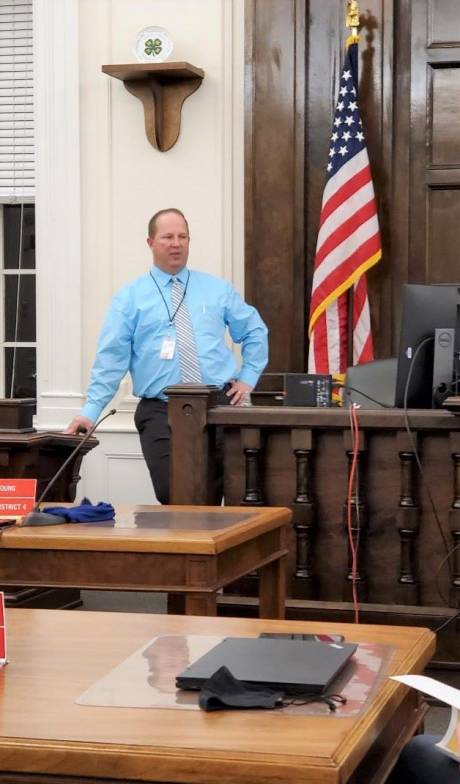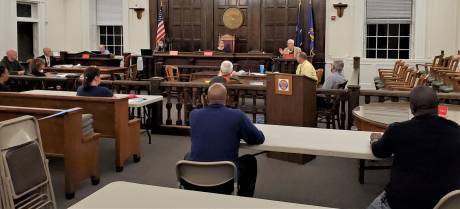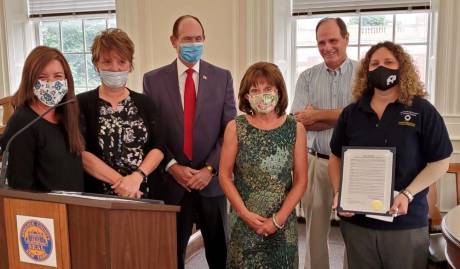Landers dives into key factors that went into 2021 proposed county budget

Supported by an audience of department heads and legislators, first-year Genesee County Matt Landers tonight formally presented the municipality’s 2021 proposed budget, a $142,953,227 all funds spending plan drafted in the midst of the COVID-19 pandemic. It increases the tax levy by $400,069 but lowers the property tax rate by 31 cents per thousand of assessed value.
No one from the public signed up to speak at the budget hearing at the Old County Courthouse.
That left it to Legislature Chair Rochelle Stein to credit management and departmental leaders for being able to “flex and pivot” to develop a budget that doesn’t override the New York State tax cap, and to Landers to summarize – or “Landerize” as he put it – the path that got the county to this point and set a course heading into 2021.
“It certainly was a challenge to put together a 140-plus million dollar budget in a pandemic, but here we are today able to present a balanced budget that is under the tax cap,” he said.
Aided by PowerPoint slides, Landers presented the following key dollar amounts and percentages for 2021:
- Recommended All Funds Budget is $142,953,227; a decrease of $759,766 or .53 percent;
- Recommended General Fund Budget is $110,241,924, a decrease of $3,767,378 or 3.30 percent;
- Recommended Property Tax Levy is $31,451,727, an increase of $400,069 or 1.28 percent;
- Tax Rate Decrease from $10.11 to $9.80, approximately 3.06 percent;
- Recommended Fund Balance Usage of $2,334,857, an increase of $534,822 from 2020 adopted budget.
Although the tax levy is going up, the tax rate is going down due to an increase in the county’s assessment.
To illustrate the property tax impact, Landers showed a slide depicting the median residential household in Genesee County with an assessed value of $106,800. It revealed that the 31-cent tax rate decrease amounts to a decrease of $33.11 in property taxes, assuming no assessment increase.
Barring any last minute adjustments by the legislature, the budget as it currently sits is scheduled to be adopted on Nov. 23.
Landers outlined several parameters that needed to be followed before his team, that included Assistant County Manager Tammi Ferringer and Executive Assistant Vicky Muckle, could dive into the numbers. Those instructions were to keep county support to the various departments “flat,” hold the line on contributions to outside agencies and funding of Genesee Community College, taking a team approach and, per the legislature’s wishes, not overriding the tax cap.
“It was a consensus that we would not be cutting them (outside agencies) but we would be at flat funding, which in itself is asking a lot of some of these agencies that are feeling the same budgetary constraints and costs and COVID-related items that we are,” Landers said. “So, I was pleased that they would accept flat funding, and most were appreciative that we did not cut them.”
He said it was a difficult decision to not increase funding to GCC, which he called “an excellent economic engine” in the county.
Landers also mentioned other factors, some triggered by COVID-19, that carried much weight in the formation of the budget, notably word out of Albany of a 20-percent reduction in state aid for most programs, double-digit increases in health care and retirement costs, $23 million in yearly state mandated services provided by the county – “with no end in sight,” he said – plus a 10- to 15-percent loss in sales tax revenue and decrease in projected interest earnings.
In response to these challenges, Landers pointed out he used more of the unexpended fund balance that he was anticipating and hopes that the county will be able to replenish it over time. He gave credit to former County Manager Jay Gsell for implementing a strategic hiring freeze, furloughing employees and deferring capital projects as the pandemic took hold.
The county also made the decision to reduce its revenue sharing with towns and villages, with Landers stating that the previous agreement was “unsustainable” in this current economy.
On the bright side, Landers said this allowed the county to increase its budget for infrastructure by $1 million next year -- $900,000 for bridges and culverts and $100,000 for roads -- a benefit that will “lessen the blow” to towns and villages because "that money will be going into their communities."
He said the budget also calls for the creation of three full-time positions (a dispatcher and two human resources employees) and a part-time person to assist the veterans service coordinator.
Looking forward, Landers said the focus will be on six areas:
- Sales Tax Revenues;
- Status of a Federal Stimulus Package;
- Status of State Aid Reductions;
- Status of COVID-19 and a Hopeful Vaccine;
- Effects of Bail Reform on Jail Population;
- State Allowing Possible Joint Jail with Orleans County.
“The (new) Genesee County Jail, pre-COVID, was the biggest story going on – right up there with water (the county’s water project),” he said. “It will be getting started shortly … as a consolidation effort with Orleans County.”
At the present time, state law prohibits joint county jails, but Landers said he his hopeful that the governor could change his position in his 2021-22 budget.
Landers acknowledged that legislators could make some “tweaks” to the budget before stating “that it is in the legislature’s hands now.”
Stein closed the session by saying the legislature is determined to fund the operations of this county, adding that the manager’s and budget office “door is open” for people to express their feelings.
“We are here to serve with you and for you,” she said.
Photo: Genesee County Manager Matt Landers at tonight's budget public hearing at the Old County Courthouse. Photo by Mike Pettinella.



